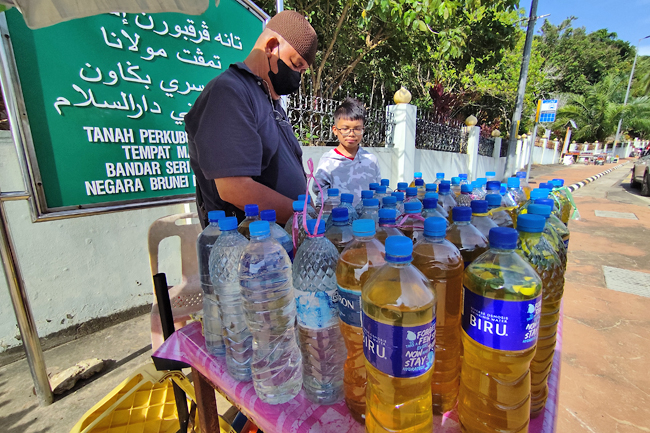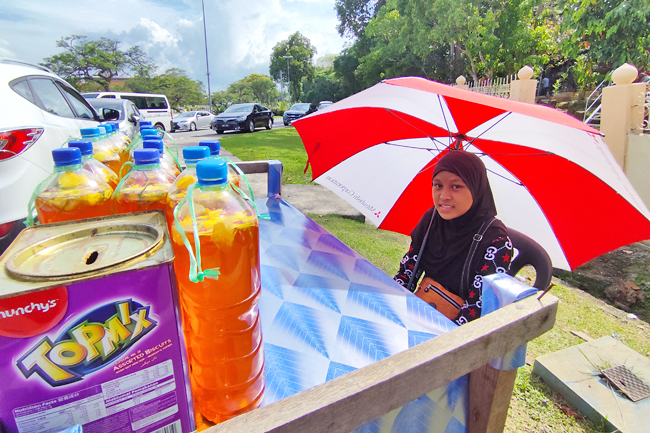Over the course of Ramadhan and on occasions throughout the year, Muslims visiting the graves of departed family members bring along Air asah-asahan, a brown-coloured water mixed with fresh flowers to pour over the graves after reciting Tahlil and Doa.
While some prefer to prepare their own air asah-asahan at home, the majority obtain it from vendors near Muslim cemeteries for convenience, while also believing in the rewards of supporting those earning for their livelihood.
Indra, a resident of the nearby Water Village has been selling Air asah-asahan since 2013.
He operates daily throughout Ramadhan and on Fridays, Sundays and public holidays during the rest of the year. Accompanied by his wife and their 12-year-old son, they leave home after Subuh prayer, travel by water taxi to Rangas Besar Muslim Cemetery in the capital and prepare the Air asah-asahan.
He noted that preparation is now simpler with the availability of asah-asahan powder, the key ingredient, unlike in the past when all ingredients had to be prepared at home.
Indra said they purchase flowers from florists, often selecting petals that have fallen or are slightly off-colour yet remain fresh. This idea, suggested by his wife, allows them to avoid sourcing flowers from the wild.
This Ramadhan, Indra observed an unexpected surge in visitors paying respects to their loved ones. He noted that two particular days – last Friday and Nuzul Al-Quran – saw exceptionally large crowds, surpassing the usual numbers seen on Fridays and Sundays.
“You can tell by the number of visitors and the cars parked along the roadside, stretching up to the walkway of the nearby bridge. And it’s not just one person per car but usually at least two or three,” he said.
For Indra, selling air asah-asahan is not limited to Ramadhan. He also operates on Fridays and Saturdays, as cemeteries remain quiet on working days. Leaving his stall unattended with a money box for payments is not an option.
“We tried that before, but when we returned, everything was scattered and the money was gone. That experience taught us a lesson. I’m not sure if other vendors face the same issue, but after it happened twice, I decided not to risk it again,” he said. Meanwhile, Haji Abdullah, who sells air asah-asahan at Dagang Muslim Cemetery, travels from Muara accompanied by his grandson.
Due to the distance, he brings empty bottles and prepares the air asah-asahan at his stall. He also carries a gallon of water, occasionally using the cemetery’s water supply when needed.
He brings his grandson along to teach him the value of hard work, rewarding him with enough to buy his favourite food and other items.
Meanwhile, Shamima remains steadfast in helping her parents sell air asah-asahan at Rangas Besar Muslim Cemetery.
Along with her four cousins, she arrives at 5am with the prepared air asah-asahan, made at home by her aunt. They take turns manning the stall until her father picks them up in the evening. “My cousins and I rotate shifts. While I wait at the stall, the others rest in a shaded area or nearby hut. When I get tired, one of them takes over. That’s why fasting doesn’t feel too difficult and it also teaches us teamwork,” she said.
Most importantly, she added, the experience is a valuable lesson on how parents work hard to provide for their children’s education and well-being, while also seeking blessings from Allah the Almighty.
The 16-year-old, a Year 11 student at Sayyidina Abu Bakar Secondary School, shared that they only sell air asah-asahan during Ramadhan, operating daily from the first day of fasting until the first day of Syawal, which is typically a busy morning. – Lyna Mohamad





